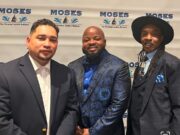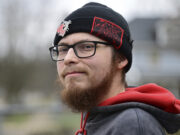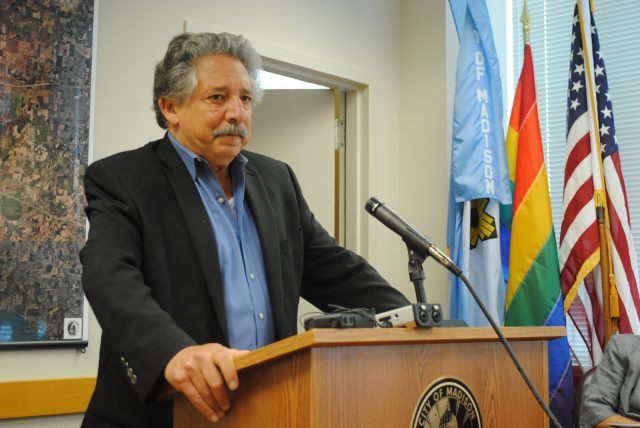Madison Mayor Paul Soglin said Friday that he plans to reintroduce a proposed ordinance to ban lying down or sleeping on downtown sidewalks, even though the Common Council rejected it by an 11-7 vote earlier in the week. He also plans to introduce a new ban on panhandling at intersections.
“If we really care about those who are homeless, he said, “we will not only provide shelter, rapid rehousing, and permanent housing … but we will also ensure that those who, often unfortunately by their own personal choice, who choose to live on the streets, to not live in life-threatening situations.”
“The Madison Common Council, I think, has taken a turn this week,” Soglin said, and some of the “no” votes may be willing to reconsider. “Many of them were on the fence,” he said. “We had many of those 11 council members who voted ‘no’ on the fence, and they acknowledged that publicly during the discussion.”
In a Friday press conference, Soglin appeared to begin persuading those alders by recasting the ordinance as “not a total ban on sleeping.”
“The proposal we were working on was very simple: people had to pick up their stuff. It’s that simple,” Soglin said. “Just pick it up neatly. It doesn’t even have to be removed. Just pick it up. It’s not a total ban on belongings, it’s not a total ban on sleeping. It’s just as we get to this part of the day, pick it up. Store it neatly. Don’t create an environment that then creates the challenges we’ve got at this site,” referring to the area outside of 30 On the Square, the office building at the corner of Carroll, Mifflin and State Streets.
“If he’s saying that’s the way it’ll be used, that’s new information,” said Alder Mark Clear, one of the leading voices against the ordinance.
In fact, the text of the ordinance says nothing about “stuff” or belongings or neatness; it only prohibits lying down and sleeping between 7 am and 10 pm on sidewalks in the Central Business District or near City offices.
“If we have rules and responsibilities to go along with our compassion it will get more people to make themselves avail to the services we have,” Soglin said. “It’s not a question of our being heartless, it’s not that stupid analogy of Alderman Clear in regards to the hammer.”
In the public debate over the ordinance, Clear has said that when all you have is a hammer, everything looks like a nail. “When you perceive that the only tool you have is an ordinance, that’s the tool you go to,” Clear said Friday, noting that there are other ways to disperse and support the homeless population. “We don’t want to worsen the problem. It’s a matter of what approach is going to be successful and is not going to be used as a stick against our most vulnerable population.”
Soglin expressed frustration that the alders opposed to the ordinance did not offer alternative solutions.
“People kept saying, ‘let’s come up with something else.’ The phrase ‘something else’ is not a solution. That’s bullshit,” Soglin said. “What we need is something specific that we know addresses the problem.”
Clear acknowledged that no specific alternatives have been proposed at this point.
“Nothing was proposed specifically, but that’s a really bad reason to pick a bad solution,” he said. “There are ongoing efforts to resolve homelessness in our community. We need to work on those efforts and expand them, absolutely.”
“Chaos”

During the Friday press conference, Soglin displayed a live video feed from outside 30 on the Square, referring to the scene as “chaos.” The video showed about a dozen people sitting or standing, and about four sleeping bags unfurled along the wall of the building. He showed several photos of homeless encampments in Portland and Seattle, where garbage was piled high and conditions clearly unsanitary.
“What I’m interested in … is simply giving police officers the ability to tell people they have to do what’s prudent and reasonable,” Soglin said.
Some of the people who spend their day outside 30 on the Square see it as another tool to allow police to harass them.
“That’s all they do is harass us homeless folks,” said one woman who declined to give her name. She said a ban on sleeping after 7 am would not change much, since police routinely rouse homeless people as early as 5 am. Another man, who also declined to be identified, said the same.
“Seven?” he said, incredulously. “They’re already out here waking everybody up at 5 every morning.”
“Time for the people of this city to act”
Clear agreed with the mayor that some of the 11 alders who voted “no” might change their minds.
“There are people who could be persuaded, but I don’t think he could do it,” Clear said, given the current sour relationship between the mayor and the Common Council.
Soglin seemed to acknowledge that, instead calling on the people of the city to persuade them.
“The engagement of the public is vital to this discussion,” he said. “For so many months there has been so much constant rejection of reasonable rules and regulation to go along with our compassion, that the public has given up. Now is the time for the people of this city to act. Now is the time to express themselves to their alders, to make it very clear.”
Soglin also plans to propose a new ban on panhandling at intersections, a practice that was banned for decades before the ban was overturned on constitutional grounds. Soglin said the new ordinance addresses those concerns. He said it’s necessary for the safety of the panhandlers and drivers alike.


































